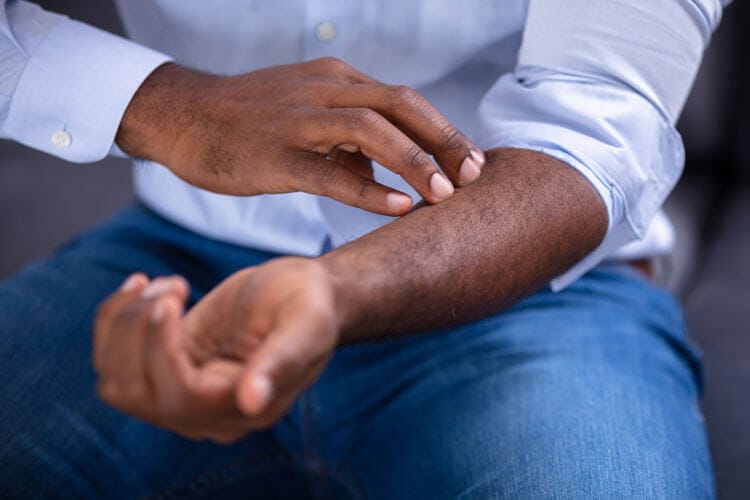Atopic Dermatitis, which is a severe form of Eczema, is a chronic and relapsing disease believed to be related to an over-reactive immune system. It is a very common disease that affects children and adults. In fact, Atopic Dermatitis is believed to affect up to 20% of all children and up to 10% of all adults. A positive is that oftentimes children will outgrow Atopic Dermatitis to where it goes away completely.
Atopic Dermatitis is characterized by dry, itchy skin, and red patches that can come and go. The rashes can occur on any part of the body but in adults they most commonly occur on the wrists, ankles, elbows, knees, and eyelids.
In some people, doctors believe the patient’s Atopic Dermatitis is a result of the body not producing enough filaggrin. Filaggrin is a protein that assists the body in building and maintaining a protective barrier on the top layer of our skin. Without this healthy protective barrier moisture can escape the skin and the skin can be highly susceptible to bacteria and viruses. This explains why many people with Atopic Dermatitis have very dry and infection-prone skin.
The most common treatments for Atopic Dermatitis include: 1) topical medications 2) phototherapy 3) immunosuppressant drugs and 4) biologic drugs.
Did you know?
- Atopic Dermatitis is not contagious
- Atopic Dermatitis is a hereditary disease
- The items that will trigger an Atopic Dermatitis attack or flare can be different from person to person
- Common triggers that will cause an Atopic Dermatitis flare are chemical irritants found in commonly used consumer products like hand soap, dish soap, laundry detergents, shampoo, perfume and colognes, etc.
- Other triggers that cause an Atopic Dermatitis attack include stress, environmental allergens (pollen, mold, pet dander, etc.) hormones, cigarette smoking, etc.
At IC Research, we believe participation in clinical research studies is one of the best ways for doctors to identify new treatments for Atopic Dermatitis and for this reason we are grateful to all of those who have participated in our research studies!

